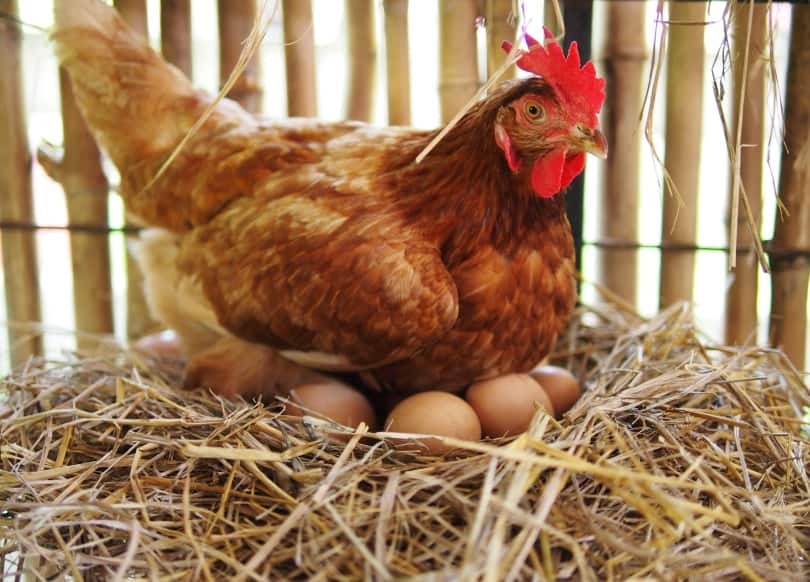Approved by Dr. Luqman Javed
You’ve finally bought some spring chickens, and the anticipation of receiving your first batch of fresh eggs is almost too much to bear. We don’t blame you for being a bit antsy!
If you can’t stop wondering when your chickens are going to lay eggs, you’ll be happy to know that there are some signs to look out for so that you have a better idea of when they’re going to arrive. Each chicken is different, and even though you’re excited, there’s no possible way to rush them. Be patient and enjoy watching your chickens mature so that there is an even deeper appreciation for them when that magical morning finally happens.
What Age Do Chicken Lay Eggs?
It sometimes feels like an eternity, but most young female chickens start laying eggs around 6 months old. Of course, some mature faster and start around 4 months, while others take their sweet time and only start after being 8 months old. There’s nothing wrong with any of these timelines. Chances are, they’ll all start laying eggs sooner rather than later, and you’ll have so many eggs that you don’t know what to do with them all.
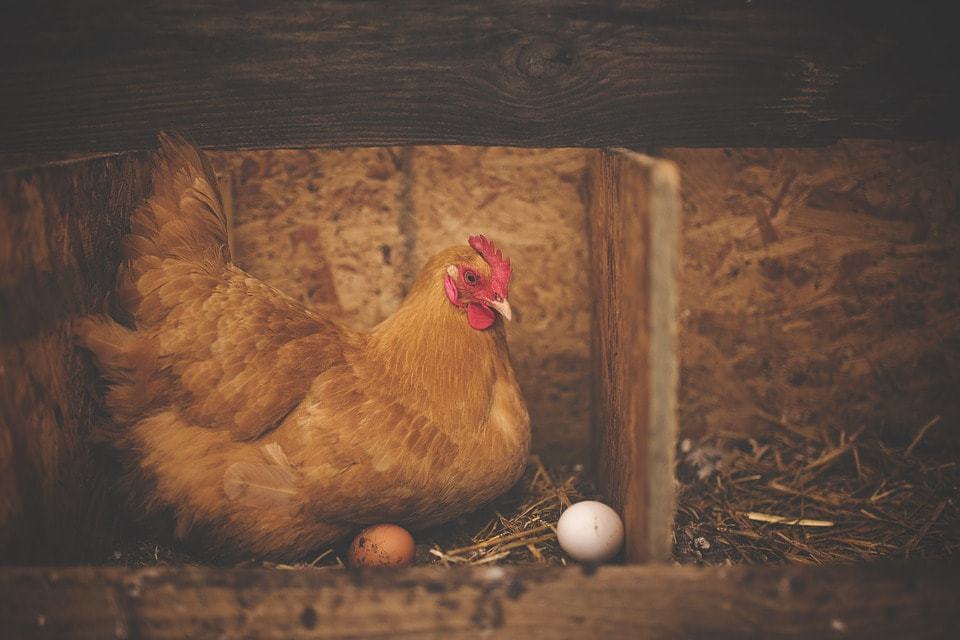
Do Some Breeds Lay Eggs Faster Than Others?
A chicken’s age isn’t the only factor that could affect how fast your chickens start laying eggs. Some chicken breeds lay eggs sooner than others and each breed has its schedule for egg development. Those that were bred solely for egg production often start by 4 months of age. Other breeds, like Wyandottes or Orpingtons, take a little bit longer.
When Do Chickens Lay Eggs?
Young chickens usually lay eggs sometime within their first year of life. If you didn’t get the chicks until late summer, though, this could delay their egg production, and they won’t start until early spring.
The reduced daylight from winter usually tells mature hens that it’s time to take a break from laying eggs. Consistent sunlight for a duration of 12–16 hours per day is a major trigger to induce egg production in hens, and therefore, they usually don’t lay eggs during the winter.
Chickens will stop laying eggs when they’re broody, that is, a state of hormonal changes where a hen tries to incubate a clutch of eggs to hatch chicks. Hens may become broody over dummy eggs and infertile eggs as well.
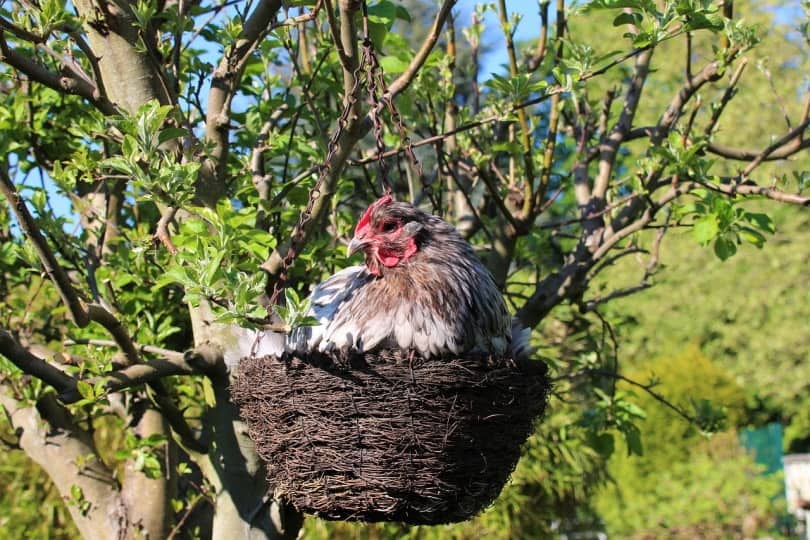

5 Signs from a Chicken That’s About to Lay Eggs
Are there any warning signs that your chickens are going to finally start the egg-laying process? Here are some ways to tell that your chicken might be ready to give you a healthy supply of eggs:
1. Chicken Age
Young chicks don’t lay eggs, and pullets (a term used for young hens that haven’t laid an egg) typically start laying eggs when they are between 16–24 weeks old. Knowing that your pullets are coming of age is a very important factor in determining the odds of an impending egg lay.
Pullets that are about to lay tend to resemble adult hens more so than chicks. They also typically begin laying after molting.
2. Enlarged Combs and Wattles
The combs are the red, fleshy part of the chicken that sits on top of their heads while the wattles hang below their beaks. These parts of the bird become increasingly large and red as they mature.
The young females develop their combs and wattles slowly, and they change from light pink to vibrant red as their hormones shift. If these chicken parts are swollen and red, that means it’s almost showtime.
Similarly, as they mature, young chicken vents also tend to become more red, swollen, and slightly moist. Conversely, a chicken not ready to lay would have a dry and pink-colored vent.
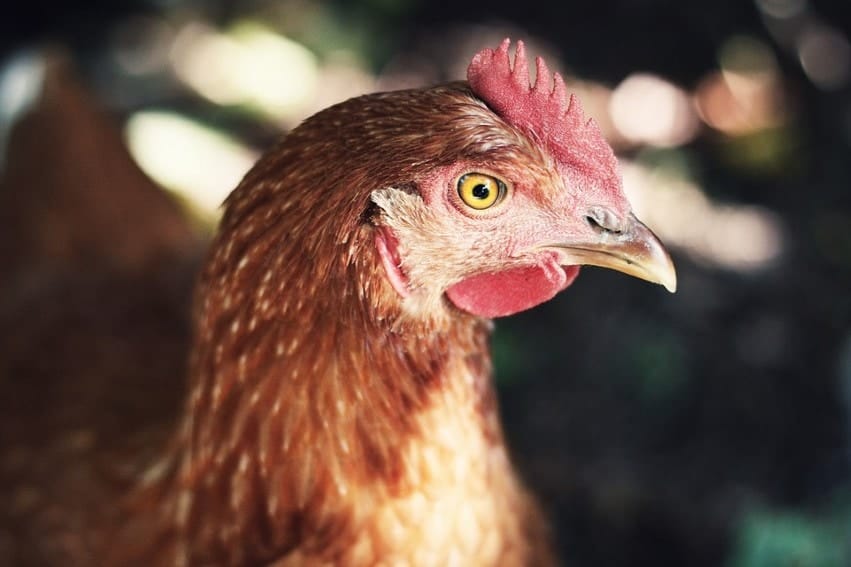
3. Your Chickens Start Exploring the Nesting Boxes
Young chicks don’t show much of an interest in the nesting boxes. It’s only after they mature that they start to test out different boxes, sit in them, and hang around that area more in general.
Your hens may also show an interest in nest building by moving around bits of straw, hay, twigs, and grass to a preferred nesting site. It’s important that your chickens can comfortably fit and sit inside their nest boxes, or they might seek to lay elsewhere.
If your flock has a rooster, you might notice him accompanying young hens to nest boxes as well.
4. The Chickens Get Louder
People think of a crowing rooster as an annoyance, but they obviously haven’t heard the songs of a chicken. Chickens tend to squawk for hours on end before they lay an egg so if it starts to feel a bit noisier at home, chances are you’ve got some gals that are preparing to lay.
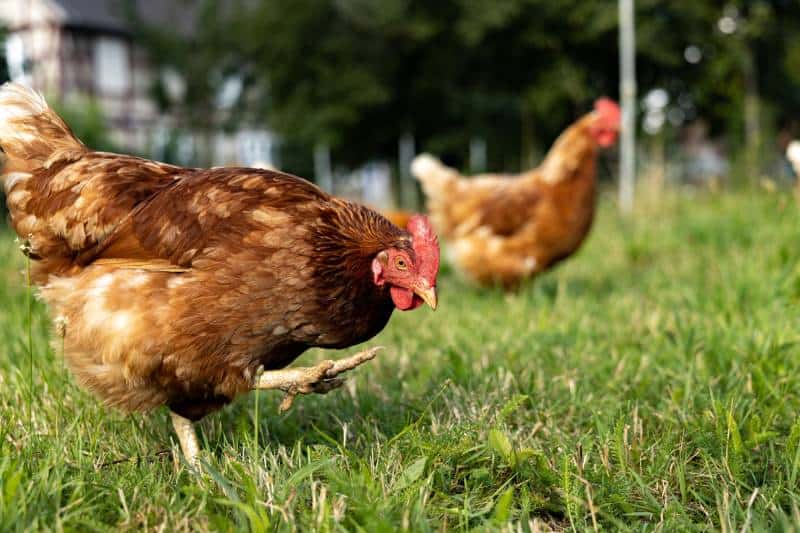
5. They Assume the Position
One of the biggest indicators that your chickens are about to lay eggs is if they start performing a squatting behavior. If you slowly put your hand out to touch your chicken, she might stop and squat down with her wings at her sides. If she does this, she is signalizing that she is ready to be mounted by a rooster to fertilize the egg. Most people don’t have a rooster around, so give her a good pat on the back and she’ll continue on her way.

Preparing for Egg Laying
It’s always better to be prepared and give your chickens a comfortable environment to lay their eggs in than to have them laying them on the ground. If you suspect your chickens might be laying eggs soon, start by cleaning out their nesting boxes and making sure there is plenty of straw for them to nest in. Keep the boxes off the floor of the coop and in a relatively quiet, cozy place free from drafts and distractions.
The more relaxed and calm they feel, the easier it is for them to start the process. Keep up with these tasks and don’t let the boxes or coop get too dirty. Your girls deserve a safe, clean place since they are doing a lot of hard work for you. It is important to note that if a hen ever feels an egg-laying site is unsafe, she may look elsewhere to lay her future eggs, and you might not find them.
What to Do When the First Eggs Arrive
Do you remember what it felt like when you walked out to find your first egg? Or are you still waiting for that magical moment to come? At some point, you’ll get to experience the excitement of finding your first egg in the coop. Don’t be too disappointed if the eggs are on the smaller side. Young chickens have smaller eggs than hens that are fully mature. It won’t be too much longer before you have a basket full of beautiful, colorful eggs that you sourced straight from your backyard.
Thanking Your Chickens
Laying eggs is exhausting work and your chickens deserve to be thanked for it. Giving them some tasty and nutritional treats is one of the best ways to show them that they’re appreciated. Remember that not every human food is safe for chicken consumption.
- Beets
- Lettuce
- Broccoli
- Cucumbers
- Carrots
- Squash
- Kale
- Swiss chard
- Lavender
- Mint
- Basil
- Parsley
- Oatmeal
- Mealworms

Final Thoughts
We know it’s exciting to buy young chickens and await the arrival of the first egg. Even though you want it to happen quickly, you can’t rush your birds. They know when it’s time to lay their eggs, and they’ll signal to you when something is about to happen. Even if they don’t show any major signs, continue to check in their boxes every day and encourage them in any way you can. Before long, your hard work will pay off and you’ll be surprised to find an egg in a nest box!
- Next on your reading list: How Long Can Chickens Go Without Food?
Featured Image Credit: PhotoSongserm, Shutterstock
